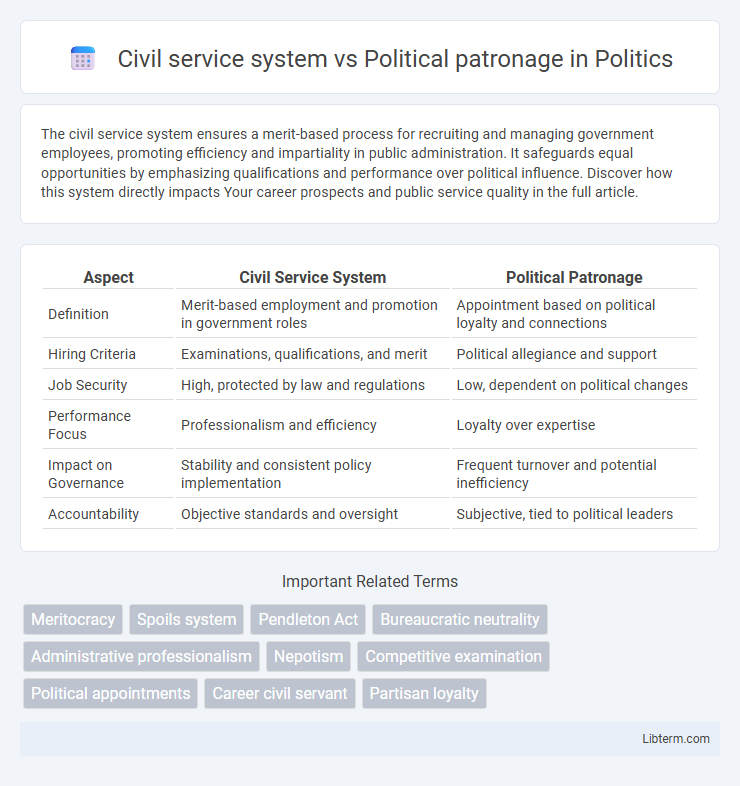The civil service system ensures a merit-based process for recruiting and managing government employees, promoting efficiency and impartiality in public administration. It safeguards equal opportunities by emphasizing qualifications and performance over political influence. Discover how this system directly impacts Your career prospects and public service quality in the full article.
Table of Comparison
| Aspect | Civil Service System | Political Patronage |
|---|---|---|
| Definition | Merit-based employment and promotion in government roles | Appointment based on political loyalty and connections |
| Hiring Criteria | Examinations, qualifications, and merit | Political allegiance and support |
| Job Security | High, protected by law and regulations | Low, dependent on political changes |
| Performance Focus | Professionalism and efficiency | Loyalty over expertise |
| Impact on Governance | Stability and consistent policy implementation | Frequent turnover and potential inefficiency |
| Accountability | Objective standards and oversight | Subjective, tied to political leaders |
Introduction to Civil Service System and Political Patronage
The civil service system is a merit-based framework for hiring and promoting government employees, emphasizing qualifications and performance to ensure efficient public administration. Political patronage, in contrast, involves appointing individuals to government positions based on political connections and loyalty rather than merit. Understanding these two approaches highlights the balance between competence-driven governance and partisan influence in public sector employment.
Historical Evolution of Government Employment Systems
The civil service system emerged in the 19th century as a merit-based approach to government employment, replacing the earlier political patronage system that allocated jobs based on party loyalty and connections. The Pendleton Civil Service Reform Act of 1883 marked a significant shift by instituting competitive exams and protecting employees from arbitrary dismissal, thereby professionalizing the public workforce. Over time, this evolution fostered a more stable and efficient bureaucracy, reducing corruption and enhancing government accountability.
Core Principles of Civil Service Systems
Civil service systems are founded on principles of meritocracy, impartiality, and professionalism, ensuring government jobs are awarded based on qualifications rather than political affiliations. These systems enforce transparent recruitment, promotion through competitive exams, and job security to maintain an efficient and unbiased workforce. In contrast, political patronage prioritizes loyalty to political figures, often compromising competence and long-term governance stability.
Key Characteristics of Political Patronage
Political patronage is characterized by the appointment of government jobs based on loyalty, support, or affiliation to a political party rather than merit or qualifications. This system often leads to favoritism, corruption, and inefficiency as jobholders prioritize political interests over public service effectiveness. Unlike the civil service system, political patronage undermines professional standards by promoting politicized hiring and firing practices.
Merit-Based Hiring vs. Political Appointments
The civil service system emphasizes merit-based hiring by using competitive exams and qualifications to ensure skilled and impartial public servants. In contrast, political patronage relies on political appointments where loyalty and connections often outweigh professional expertise. Merit-based hiring promotes efficiency and accountability, while political appointments risk favoritism and decreased government performance.
Advantages of Civil Service Systems
Civil service systems enhance government efficiency by promoting merit-based hiring, ensuring employees are selected and retained based on qualifications and performance rather than political connections. This approach reduces corruption and favoritism, fostering greater stability and continuity in public administration. As a result, civil services improve policy implementation and public trust by maintaining professionalism and accountability in government operations.
Drawbacks of Political Patronage
Political patronage undermines meritocracy by prioritizing loyalty over qualifications, leading to inefficiency and corruption within public administration. This system often results in frequent turnover of skilled personnel, disrupting continuity and reducing government effectiveness. Furthermore, political patronage erodes public trust by fostering favoritism and nepotism, compromising the fairness and impartiality of civil service operations.
Impact on Government Efficiency and Accountability
The civil service system enhances government efficiency by promoting merit-based hiring, professional expertise, and continuity in public administration, reducing turnover linked to political cycles. Political patronage often compromises accountability by appointing officials based on loyalty rather than qualifications, increasing risks of corruption and inefficiency. Empirical studies show that governments with strong civil service systems achieve higher policy implementation rates and public trust compared to patronage-dominated administrations.
Global Examples: Civil Service and Patronage in Practice
Civil service systems, exemplified by the United Kingdom's merit-based recruitment through the Civil Service Commission, emphasize professionalized, non-partisan administration, contrasting with political patronage systems like those historically observed in the United States during the 19th century's spoils system that rewarded political supporters with government jobs. Singapore's rigorous civil service model exemplifies efficiency and expertise-based appointments, while Brazil's patronage system reflects challenges of corruption and clientelism in governance. These global examples illustrate the impact of structured civil services on institutional stability versus the risks of politicized appointments undermining public trust and administrative effectiveness.
Future Trends in Public Sector Employment
The civil service system is increasingly adopting merit-based recruitment and digital platforms, enhancing transparency and efficiency in public sector employment. Political patronage, traditionally characterized by appointments based on loyalty rather than qualifications, faces growing scrutiny due to demands for accountability and professional expertise. Future trends emphasize automated candidate assessments, performance analytics, and inclusive hiring practices to foster a skilled, impartial workforce in government roles.
Civil service system Infographic

 libterm.com
libterm.com